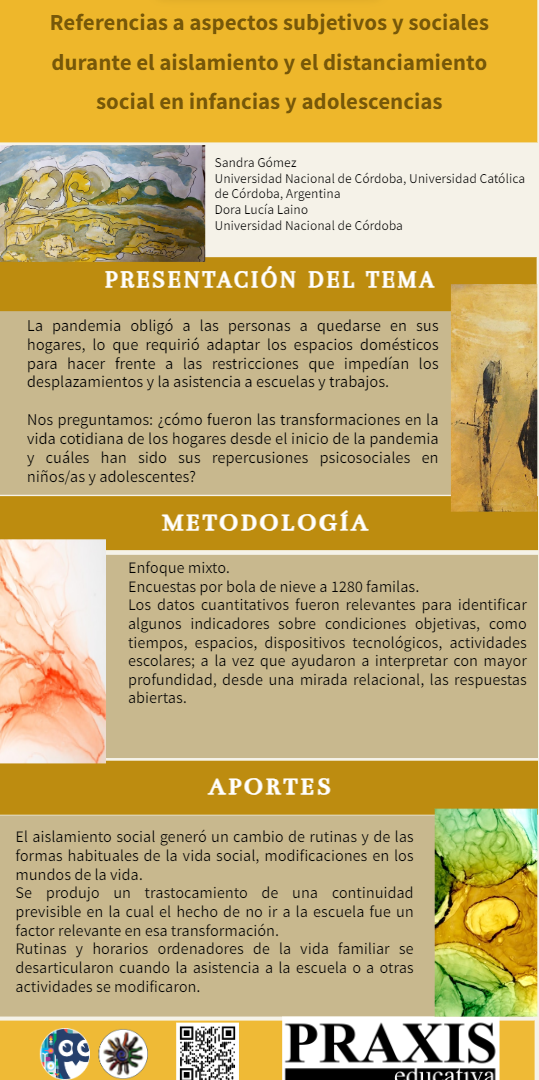References to subjective and social aspects during isolation and social distancing in childhood and adolescence
DOI:
https://doi.org/10.19137/praxiseducativa-2023-270309Keywords:
family; school; psychosociology; pandemic; transformationAbstract
The research covered several dimensions related to the transformations in daily and school life, produced by the measures of isolation and preventive and compulsory social distancing. In this paper, we will focus on those repercussions linked to the subjective from the perspective of adults when they talk about their children. In this sense, we share interpretations from a virtual survey carried out by 1280 families from different parts of the national territory, administered in the middle of 2021. At the same time, descriptive references to schooling in households are offered and relationships are articulated to work on the psychosocial effects that the emergency measures imposed, modifying family, school, social, and labour daily life. The qualitative analysis of the open-ended responses is made from a sociopsychogenetic perspective, allowing articulation of subjective, social, and cognitive aspects interpreted from a historical and relational perspective.
Downloads
References
Bourdieu, P. (1997) El sentido práctico. Siglo XXI.
Bourdieu, P. (1998) Razones prácticas. Sobre la teoría de la acción. Anagrama.
Bourdieu, P.; Wacquant, L. (1995) Respuestas. Por una antropología reflexiva. Grijalbo
Bourdieu, P.; Wacquant, L. (2005) Una invitación a la sociología reflexiva. Siglo XXI.
Erades, N.; Morales, A. (2020) Impacto psicológico del confinamiento por la COVID-19 en niños españoles: un estudio transversal. Revista de Psicología Clínica con Niños y Adolescentes. 7 (3) pp. 27-34
Marcuse, H. (1993) El hombre unidimensional. Planeta
Greimas, A.; Fontanille, J. (2002) Semiótica de las pasiones. De los estados de cosas a los estados de ánimo. Siglo XXI.
XXX, ; XXX. (2022) Transformaciones en la cotidianeidad en tiempos de pandemia desde la perspectiva de las familias. Revista Argonautas.12. (18) pp.7-27
Habermas, J. (1999) Teoría de la acción comunicativa. Tomo 2. Taurus.
Laino, D. (2000) Aspectos psicosociales del aprendizaje. Homo Sapiens.
Laino, D.; Gomez, S. (2020) Aprendizaje en contextos de aislamiento. Adaptación de las prácticas y construcción de nuevos esquemas y hábitos. En Beltramino, Laura (comp.) Aprendizajes y prácticas educativas en las actuales condiciones de época: COVID-19. Córdoba. Argentina: Universidad Nacional de Córdoba.pp.124-131
Piaget, J. (2000). La equilibración de las estructuras cognitivas. Problema central del desarrollo. Siglo XXI.
Piaget, J.; García, R. (1987) Hacia una lógica de significaciones. Centro editor de América Latina
Ramonet, I. (2020) La pandemia y el sistema. -mundo Le Monde diplomatique
https://www.eldiplo.org/wp-content/uploads/2020/04/Ramonet-pandemia-sistema-mundo.pdf
Rosa, H. (2016) Alienación y aceleración. Hacia una teoría crítica de la temporalidad en la modernidad tardía. Katz
Sánchez Boris, I. (2021) Impacto psicológico de la COVID-19 en niños y adolescentes. Medisan. 25 (1):123 Santiago de Cuba. Recuperado de http://scielo.sld.cu/scielo.php?script=sci_arttext&pid=S1029-30192021000100123#B24
Organización Panamericana de Salud/ Organización Mundial de la Salud https://www.paho.org/sites/default/files/2020-03/smaps-coronavirus-es-final-17-mar-20.pdf
Unwin, J.; Hillis, S. (2022) Global, regional, and national minimum estimates of children affected by COVID-19-associated orphanhood and caregiver death, by age and family circumstance up to Oct 31, 2021: an updated modelling study. Revista Lancet Child Adolesc Health. Recuperado de https://www.thelancet.com/action/showPdf?pii=S2352-4642%2822%2900005-0
Wiggershaus, R. (2010) La Escuela de Fráncfort. Fondo de Cultura Económica
Yaguana Martínez, Y.; Calvopiña Esquivel, L.; Espín Beltrán, M.; Romero Cevallos, J. (2021) Impacto psicológico de la Covid-19 en niños y su entorno familiar. Revista Recimundo 5. (4) pp.323-331
Zizek, S. (2003) El sublime objeto de la ideología. Siglo XXI

Published
Issue
Section
License
Copyright Notice
Editorial Committee Educational Praxis Magazine:
I hereby declare that I am the author of the article titled (article name), that it is original and my own and that it was not previously published in any other format or medium. I declare to know that the magazine will not charge me any type of fee under any circumstances, nor will I receive any type of monetary compensation If it were accepted for publication in Educational Praxis, I authorize the aforementioned magazine to publish it digitally and to advertise it on its social networks.
If the work is published, I adhere to the Creative Commons license called "Attribution - Non-Commercial Share Alike CC BY-NC-SA", through which it is allowed to copy, reproduce, distribute, publicly communicate the work and generate derivative works, as long as when the original author is cited and acknowledged. This license has been used since September 2018. In 2016 CC BY NC ND 4.0 was adhered to; and in the years 2017 and 2018 (January-August) CC BY NC 4.0.
This CC BY-NC-SA Share Alike license does not, however, permit commercial use of the work. As an author, the journal may establish additional agreements for the non-exclusive distribution of the version of the work published in the journal, it allows me to self-archive the published articles, in their post-print version, in institutional, thematic repositories, personal web pages or any other relevant use. with the recognition of having been first published in this journal.
Educational Praxis adheres to DORA (Declaration on Research Assessment) signed in San Francisco, California, on December 16, 2012, and to the Declaration of Mexico (Joint Declaration LATINDEX - REDALYC - CLACSO - IBICT).














_(1)2.png)


3.png)











_(2).png)






2.jpg)









